Mental Health Nursing: Therapeutic Relationships and Depression
VerifiedAdded on 2023/01/04
|7
|1695
|39
Essay
AI Summary
This essay delves into the crucial role of mental health nurses in establishing therapeutic alliances with individuals experiencing depression. It highlights the importance of open and transparent communication, exploring various strategies and theories, such as Peplau’s theory of interpersonal relationships and culturally sensitive care. The essay emphasizes how these approaches empower patients, address hopelessness, and improve their satisfaction with care. It also discusses the significance of these alliances in combating stigma related to mental illness. The essay concludes that building strong therapeutic relationships is paramount for positive patient outcomes and effective mental health care. It highlights the importance of understanding cultural backgrounds and applying communication theories to provide the best care. The essay supports its arguments with evidence and literature, demonstrating the positive effects of these strategies in mental health care.
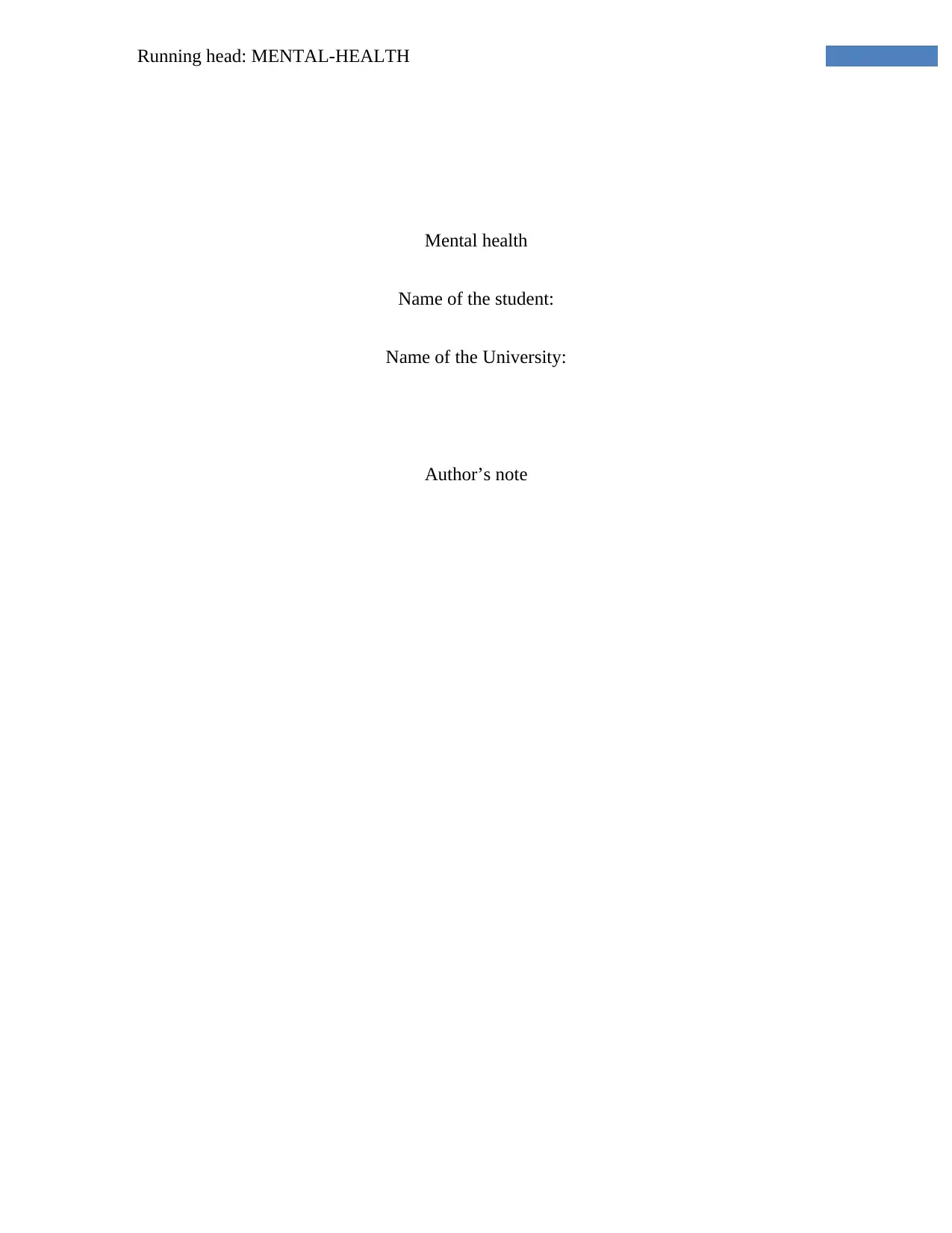
Running head: MENTAL-HEALTH
Mental health
Name of the student:
Name of the University:
Author’s note
Mental health
Name of the student:
Name of the University:
Author’s note
Paraphrase This Document
Need a fresh take? Get an instant paraphrase of this document with our AI Paraphraser
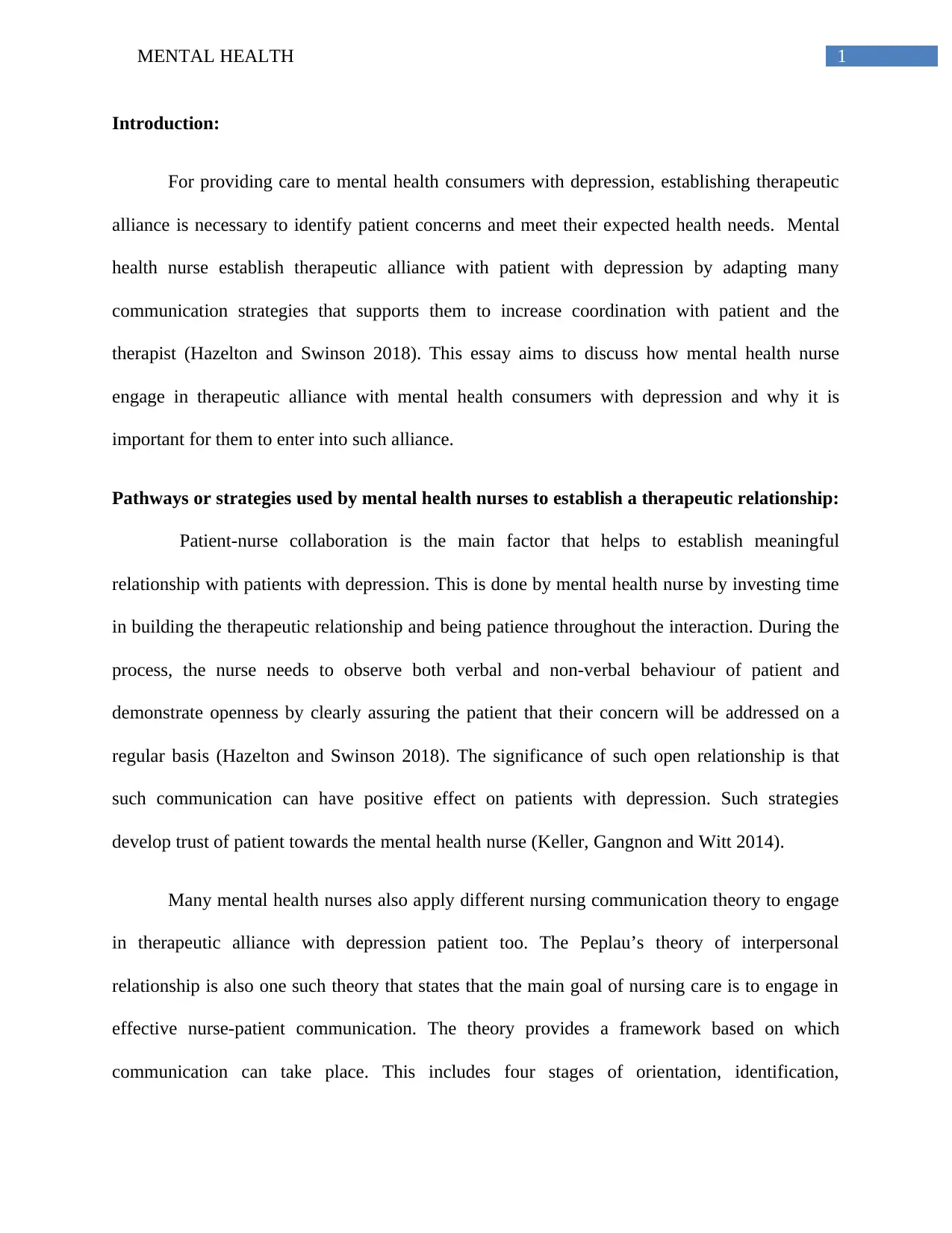
1MENTAL HEALTH
Introduction:
For providing care to mental health consumers with depression, establishing therapeutic
alliance is necessary to identify patient concerns and meet their expected health needs. Mental
health nurse establish therapeutic alliance with patient with depression by adapting many
communication strategies that supports them to increase coordination with patient and the
therapist (Hazelton and Swinson 2018). This essay aims to discuss how mental health nurse
engage in therapeutic alliance with mental health consumers with depression and why it is
important for them to enter into such alliance.
Pathways or strategies used by mental health nurses to establish a therapeutic relationship:
Patient-nurse collaboration is the main factor that helps to establish meaningful
relationship with patients with depression. This is done by mental health nurse by investing time
in building the therapeutic relationship and being patience throughout the interaction. During the
process, the nurse needs to observe both verbal and non-verbal behaviour of patient and
demonstrate openness by clearly assuring the patient that their concern will be addressed on a
regular basis (Hazelton and Swinson 2018). The significance of such open relationship is that
such communication can have positive effect on patients with depression. Such strategies
develop trust of patient towards the mental health nurse (Keller, Gangnon and Witt 2014).
Many mental health nurses also apply different nursing communication theory to engage
in therapeutic alliance with depression patient too. The Peplau’s theory of interpersonal
relationship is also one such theory that states that the main goal of nursing care is to engage in
effective nurse-patient communication. The theory provides a framework based on which
communication can take place. This includes four stages of orientation, identification,
Introduction:
For providing care to mental health consumers with depression, establishing therapeutic
alliance is necessary to identify patient concerns and meet their expected health needs. Mental
health nurse establish therapeutic alliance with patient with depression by adapting many
communication strategies that supports them to increase coordination with patient and the
therapist (Hazelton and Swinson 2018). This essay aims to discuss how mental health nurse
engage in therapeutic alliance with mental health consumers with depression and why it is
important for them to enter into such alliance.
Pathways or strategies used by mental health nurses to establish a therapeutic relationship:
Patient-nurse collaboration is the main factor that helps to establish meaningful
relationship with patients with depression. This is done by mental health nurse by investing time
in building the therapeutic relationship and being patience throughout the interaction. During the
process, the nurse needs to observe both verbal and non-verbal behaviour of patient and
demonstrate openness by clearly assuring the patient that their concern will be addressed on a
regular basis (Hazelton and Swinson 2018). The significance of such open relationship is that
such communication can have positive effect on patients with depression. Such strategies
develop trust of patient towards the mental health nurse (Keller, Gangnon and Witt 2014).
Many mental health nurses also apply different nursing communication theory to engage
in therapeutic alliance with depression patient too. The Peplau’s theory of interpersonal
relationship is also one such theory that states that the main goal of nursing care is to engage in
effective nurse-patient communication. The theory provides a framework based on which
communication can take place. This includes four stages of orientation, identification,
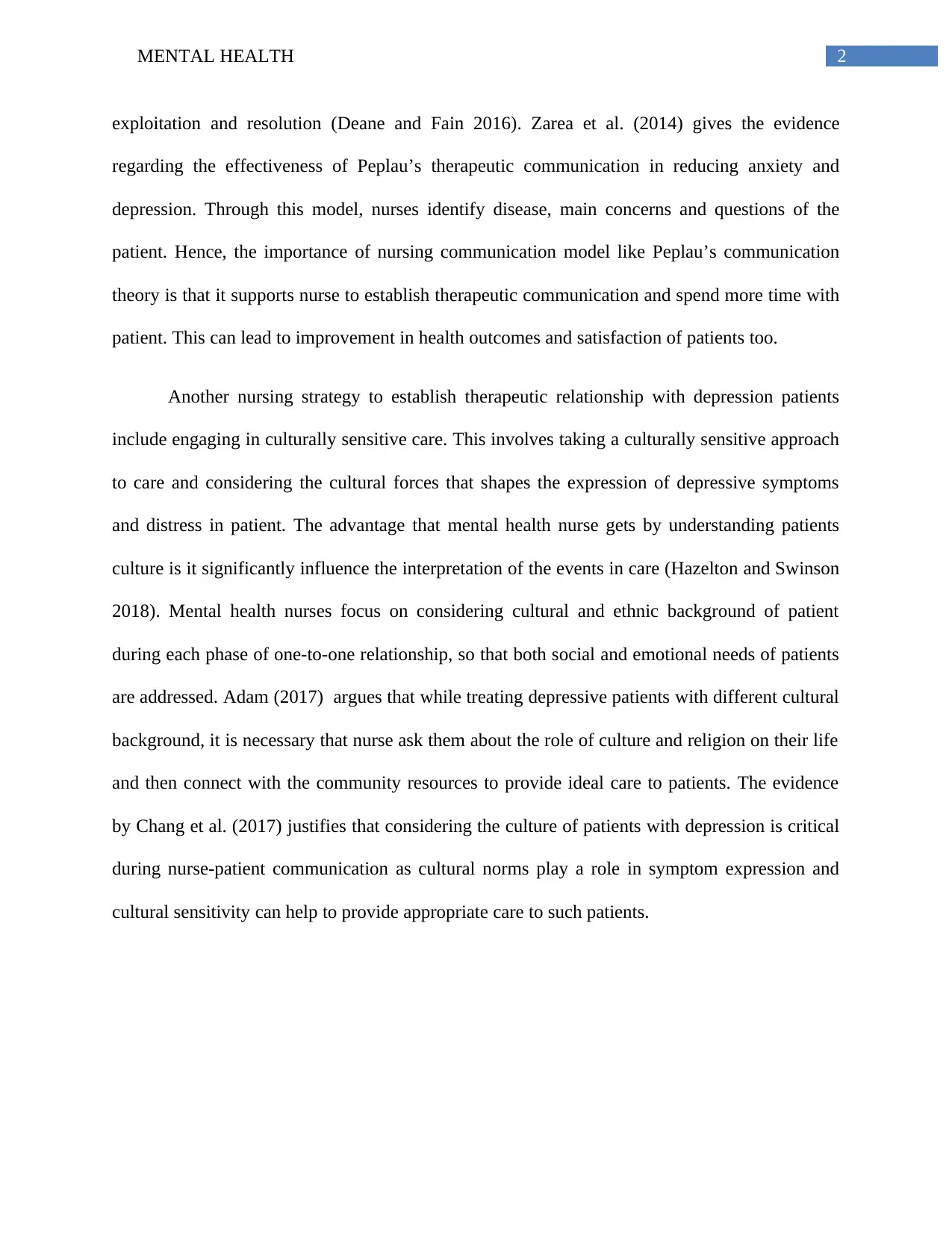
2MENTAL HEALTH
exploitation and resolution (Deane and Fain 2016). Zarea et al. (2014) gives the evidence
regarding the effectiveness of Peplau’s therapeutic communication in reducing anxiety and
depression. Through this model, nurses identify disease, main concerns and questions of the
patient. Hence, the importance of nursing communication model like Peplau’s communication
theory is that it supports nurse to establish therapeutic communication and spend more time with
patient. This can lead to improvement in health outcomes and satisfaction of patients too.
Another nursing strategy to establish therapeutic relationship with depression patients
include engaging in culturally sensitive care. This involves taking a culturally sensitive approach
to care and considering the cultural forces that shapes the expression of depressive symptoms
and distress in patient. The advantage that mental health nurse gets by understanding patients
culture is it significantly influence the interpretation of the events in care (Hazelton and Swinson
2018). Mental health nurses focus on considering cultural and ethnic background of patient
during each phase of one-to-one relationship, so that both social and emotional needs of patients
are addressed. Adam (2017) argues that while treating depressive patients with different cultural
background, it is necessary that nurse ask them about the role of culture and religion on their life
and then connect with the community resources to provide ideal care to patients. The evidence
by Chang et al. (2017) justifies that considering the culture of patients with depression is critical
during nurse-patient communication as cultural norms play a role in symptom expression and
cultural sensitivity can help to provide appropriate care to such patients.
exploitation and resolution (Deane and Fain 2016). Zarea et al. (2014) gives the evidence
regarding the effectiveness of Peplau’s therapeutic communication in reducing anxiety and
depression. Through this model, nurses identify disease, main concerns and questions of the
patient. Hence, the importance of nursing communication model like Peplau’s communication
theory is that it supports nurse to establish therapeutic communication and spend more time with
patient. This can lead to improvement in health outcomes and satisfaction of patients too.
Another nursing strategy to establish therapeutic relationship with depression patients
include engaging in culturally sensitive care. This involves taking a culturally sensitive approach
to care and considering the cultural forces that shapes the expression of depressive symptoms
and distress in patient. The advantage that mental health nurse gets by understanding patients
culture is it significantly influence the interpretation of the events in care (Hazelton and Swinson
2018). Mental health nurses focus on considering cultural and ethnic background of patient
during each phase of one-to-one relationship, so that both social and emotional needs of patients
are addressed. Adam (2017) argues that while treating depressive patients with different cultural
background, it is necessary that nurse ask them about the role of culture and religion on their life
and then connect with the community resources to provide ideal care to patients. The evidence
by Chang et al. (2017) justifies that considering the culture of patients with depression is critical
during nurse-patient communication as cultural norms play a role in symptom expression and
cultural sensitivity can help to provide appropriate care to such patients.
⊘ This is a preview!⊘
Do you want full access?
Subscribe today to unlock all pages.

Trusted by 1+ million students worldwide
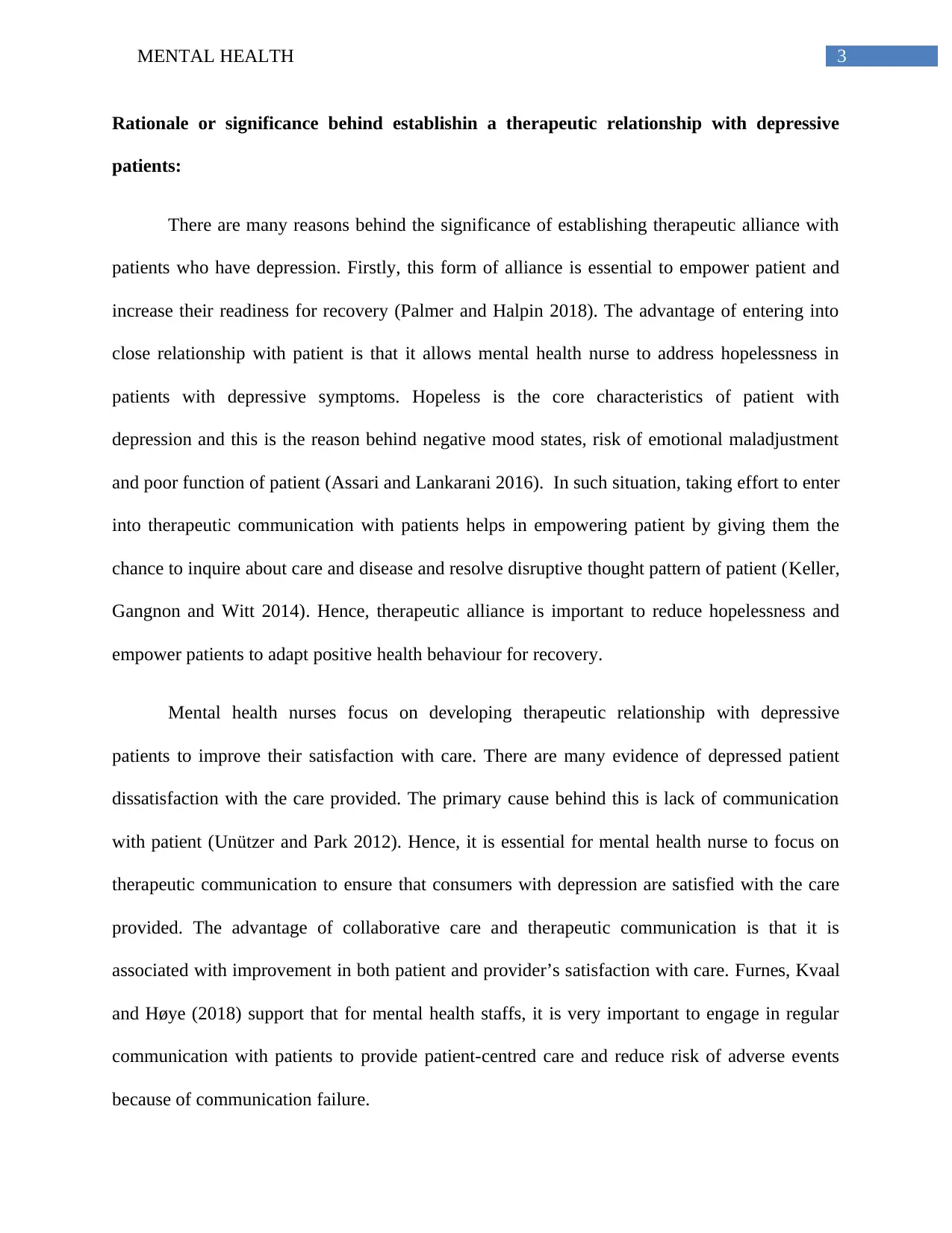
3MENTAL HEALTH
Rationale or significance behind establishin a therapeutic relationship with depressive
patients:
There are many reasons behind the significance of establishing therapeutic alliance with
patients who have depression. Firstly, this form of alliance is essential to empower patient and
increase their readiness for recovery (Palmer and Halpin 2018). The advantage of entering into
close relationship with patient is that it allows mental health nurse to address hopelessness in
patients with depressive symptoms. Hopeless is the core characteristics of patient with
depression and this is the reason behind negative mood states, risk of emotional maladjustment
and poor function of patient (Assari and Lankarani 2016). In such situation, taking effort to enter
into therapeutic communication with patients helps in empowering patient by giving them the
chance to inquire about care and disease and resolve disruptive thought pattern of patient (Keller,
Gangnon and Witt 2014). Hence, therapeutic alliance is important to reduce hopelessness and
empower patients to adapt positive health behaviour for recovery.
Mental health nurses focus on developing therapeutic relationship with depressive
patients to improve their satisfaction with care. There are many evidence of depressed patient
dissatisfaction with the care provided. The primary cause behind this is lack of communication
with patient (Unützer and Park 2012). Hence, it is essential for mental health nurse to focus on
therapeutic communication to ensure that consumers with depression are satisfied with the care
provided. The advantage of collaborative care and therapeutic communication is that it is
associated with improvement in both patient and provider’s satisfaction with care. Furnes, Kvaal
and Høye (2018) support that for mental health staffs, it is very important to engage in regular
communication with patients to provide patient-centred care and reduce risk of adverse events
because of communication failure.
Rationale or significance behind establishin a therapeutic relationship with depressive
patients:
There are many reasons behind the significance of establishing therapeutic alliance with
patients who have depression. Firstly, this form of alliance is essential to empower patient and
increase their readiness for recovery (Palmer and Halpin 2018). The advantage of entering into
close relationship with patient is that it allows mental health nurse to address hopelessness in
patients with depressive symptoms. Hopeless is the core characteristics of patient with
depression and this is the reason behind negative mood states, risk of emotional maladjustment
and poor function of patient (Assari and Lankarani 2016). In such situation, taking effort to enter
into therapeutic communication with patients helps in empowering patient by giving them the
chance to inquire about care and disease and resolve disruptive thought pattern of patient (Keller,
Gangnon and Witt 2014). Hence, therapeutic alliance is important to reduce hopelessness and
empower patients to adapt positive health behaviour for recovery.
Mental health nurses focus on developing therapeutic relationship with depressive
patients to improve their satisfaction with care. There are many evidence of depressed patient
dissatisfaction with the care provided. The primary cause behind this is lack of communication
with patient (Unützer and Park 2012). Hence, it is essential for mental health nurse to focus on
therapeutic communication to ensure that consumers with depression are satisfied with the care
provided. The advantage of collaborative care and therapeutic communication is that it is
associated with improvement in both patient and provider’s satisfaction with care. Furnes, Kvaal
and Høye (2018) support that for mental health staffs, it is very important to engage in regular
communication with patients to provide patient-centred care and reduce risk of adverse events
because of communication failure.
Paraphrase This Document
Need a fresh take? Get an instant paraphrase of this document with our AI Paraphraser
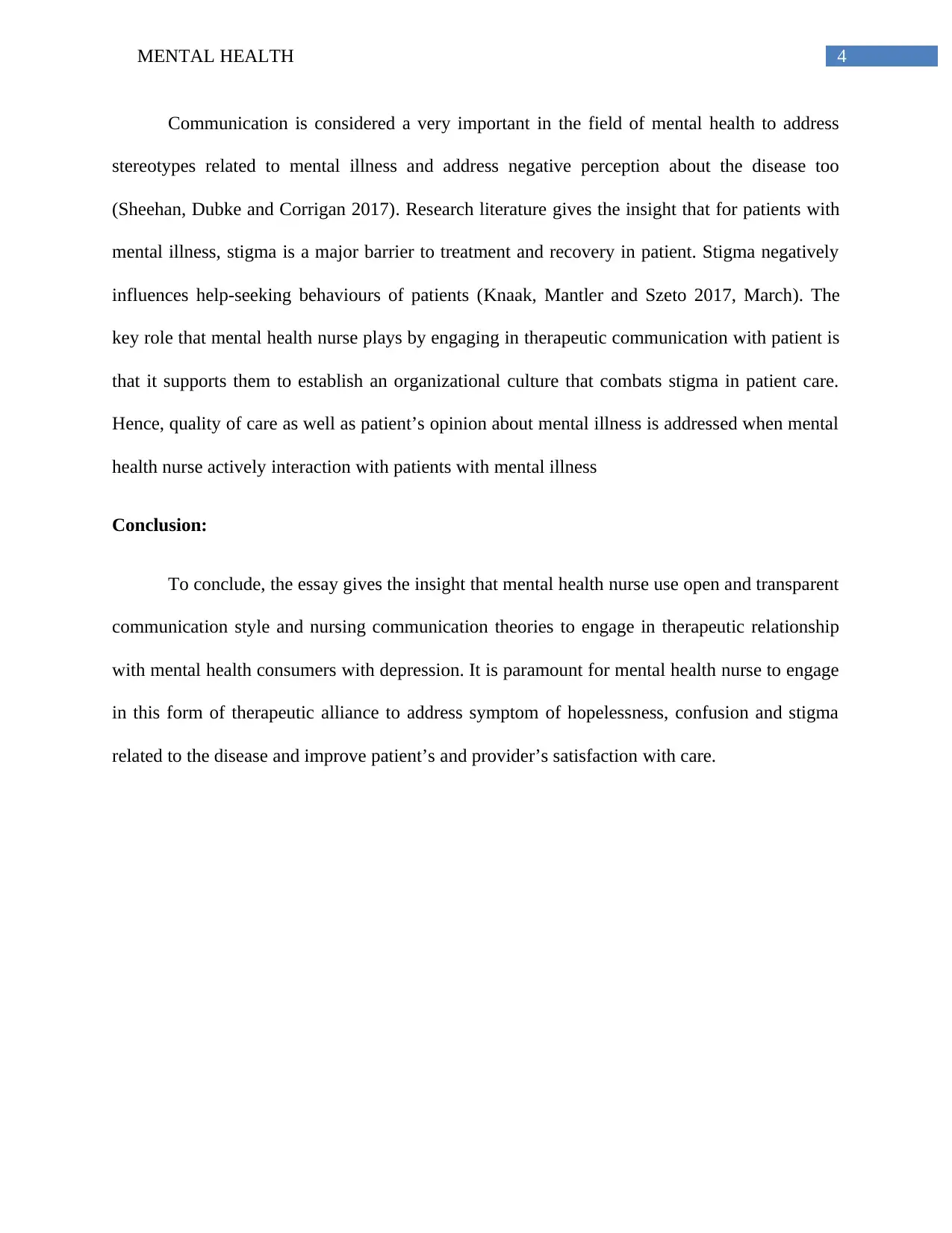
4MENTAL HEALTH
Communication is considered a very important in the field of mental health to address
stereotypes related to mental illness and address negative perception about the disease too
(Sheehan, Dubke and Corrigan 2017). Research literature gives the insight that for patients with
mental illness, stigma is a major barrier to treatment and recovery in patient. Stigma negatively
influences help-seeking behaviours of patients (Knaak, Mantler and Szeto 2017, March). The
key role that mental health nurse plays by engaging in therapeutic communication with patient is
that it supports them to establish an organizational culture that combats stigma in patient care.
Hence, quality of care as well as patient’s opinion about mental illness is addressed when mental
health nurse actively interaction with patients with mental illness
Conclusion:
To conclude, the essay gives the insight that mental health nurse use open and transparent
communication style and nursing communication theories to engage in therapeutic relationship
with mental health consumers with depression. It is paramount for mental health nurse to engage
in this form of therapeutic alliance to address symptom of hopelessness, confusion and stigma
related to the disease and improve patient’s and provider’s satisfaction with care.
Communication is considered a very important in the field of mental health to address
stereotypes related to mental illness and address negative perception about the disease too
(Sheehan, Dubke and Corrigan 2017). Research literature gives the insight that for patients with
mental illness, stigma is a major barrier to treatment and recovery in patient. Stigma negatively
influences help-seeking behaviours of patients (Knaak, Mantler and Szeto 2017, March). The
key role that mental health nurse plays by engaging in therapeutic communication with patient is
that it supports them to establish an organizational culture that combats stigma in patient care.
Hence, quality of care as well as patient’s opinion about mental illness is addressed when mental
health nurse actively interaction with patients with mental illness
Conclusion:
To conclude, the essay gives the insight that mental health nurse use open and transparent
communication style and nursing communication theories to engage in therapeutic relationship
with mental health consumers with depression. It is paramount for mental health nurse to engage
in this form of therapeutic alliance to address symptom of hopelessness, confusion and stigma
related to the disease and improve patient’s and provider’s satisfaction with care.
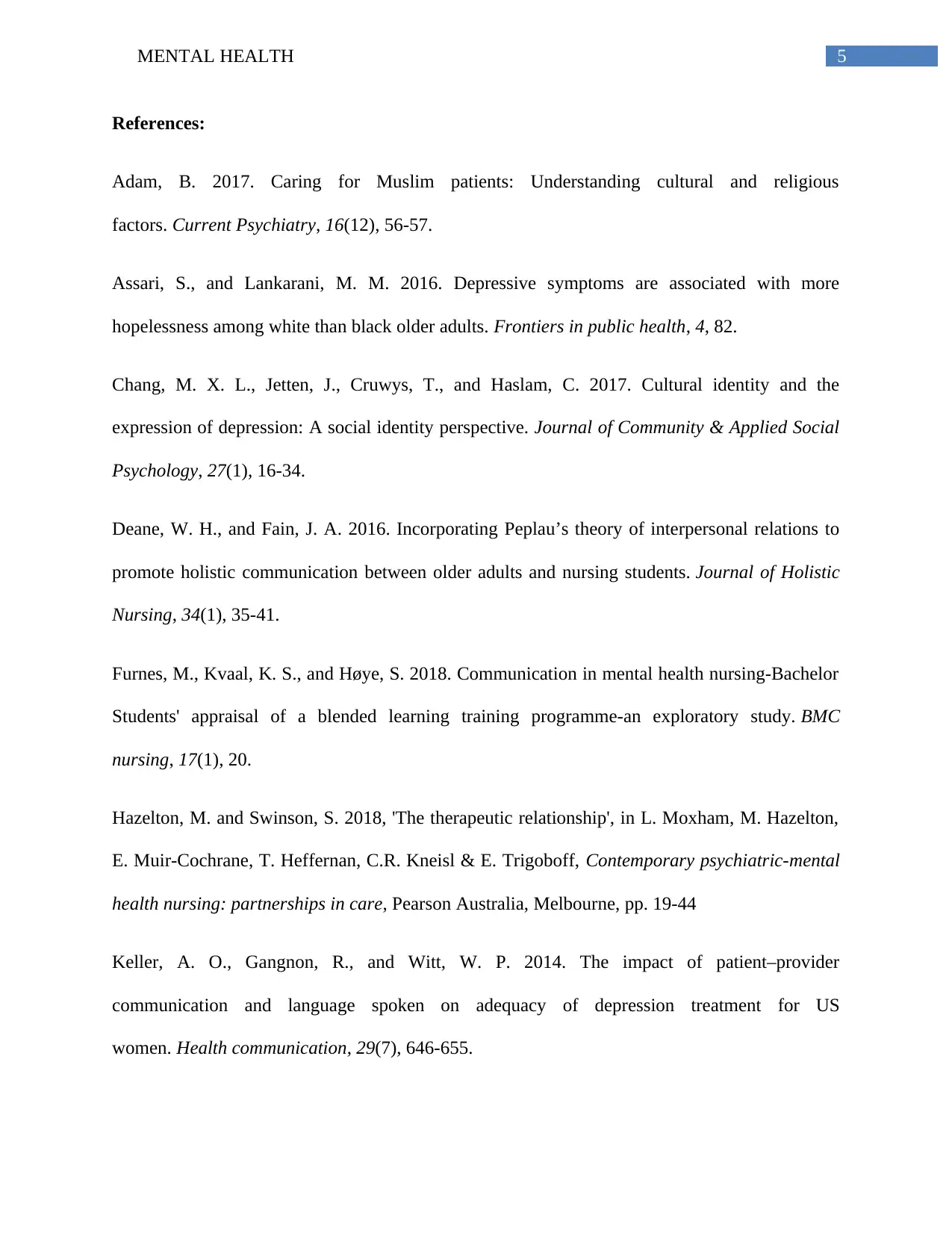
5MENTAL HEALTH
References:
Adam, B. 2017. Caring for Muslim patients: Understanding cultural and religious
factors. Current Psychiatry, 16(12), 56-57.
Assari, S., and Lankarani, M. M. 2016. Depressive symptoms are associated with more
hopelessness among white than black older adults. Frontiers in public health, 4, 82.
Chang, M. X. L., Jetten, J., Cruwys, T., and Haslam, C. 2017. Cultural identity and the
expression of depression: A social identity perspective. Journal of Community & Applied Social
Psychology, 27(1), 16-34.
Deane, W. H., and Fain, J. A. 2016. Incorporating Peplau’s theory of interpersonal relations to
promote holistic communication between older adults and nursing students. Journal of Holistic
Nursing, 34(1), 35-41.
Furnes, M., Kvaal, K. S., and Høye, S. 2018. Communication in mental health nursing-Bachelor
Students' appraisal of a blended learning training programme-an exploratory study. BMC
nursing, 17(1), 20.
Hazelton, M. and Swinson, S. 2018, 'The therapeutic relationship', in L. Moxham, M. Hazelton,
E. Muir-Cochrane, T. Heffernan, C.R. Kneisl & E. Trigoboff, Contemporary psychiatric-mental
health nursing: partnerships in care, Pearson Australia, Melbourne, pp. 19-44
Keller, A. O., Gangnon, R., and Witt, W. P. 2014. The impact of patient–provider
communication and language spoken on adequacy of depression treatment for US
women. Health communication, 29(7), 646-655.
References:
Adam, B. 2017. Caring for Muslim patients: Understanding cultural and religious
factors. Current Psychiatry, 16(12), 56-57.
Assari, S., and Lankarani, M. M. 2016. Depressive symptoms are associated with more
hopelessness among white than black older adults. Frontiers in public health, 4, 82.
Chang, M. X. L., Jetten, J., Cruwys, T., and Haslam, C. 2017. Cultural identity and the
expression of depression: A social identity perspective. Journal of Community & Applied Social
Psychology, 27(1), 16-34.
Deane, W. H., and Fain, J. A. 2016. Incorporating Peplau’s theory of interpersonal relations to
promote holistic communication between older adults and nursing students. Journal of Holistic
Nursing, 34(1), 35-41.
Furnes, M., Kvaal, K. S., and Høye, S. 2018. Communication in mental health nursing-Bachelor
Students' appraisal of a blended learning training programme-an exploratory study. BMC
nursing, 17(1), 20.
Hazelton, M. and Swinson, S. 2018, 'The therapeutic relationship', in L. Moxham, M. Hazelton,
E. Muir-Cochrane, T. Heffernan, C.R. Kneisl & E. Trigoboff, Contemporary psychiatric-mental
health nursing: partnerships in care, Pearson Australia, Melbourne, pp. 19-44
Keller, A. O., Gangnon, R., and Witt, W. P. 2014. The impact of patient–provider
communication and language spoken on adequacy of depression treatment for US
women. Health communication, 29(7), 646-655.
⊘ This is a preview!⊘
Do you want full access?
Subscribe today to unlock all pages.

Trusted by 1+ million students worldwide
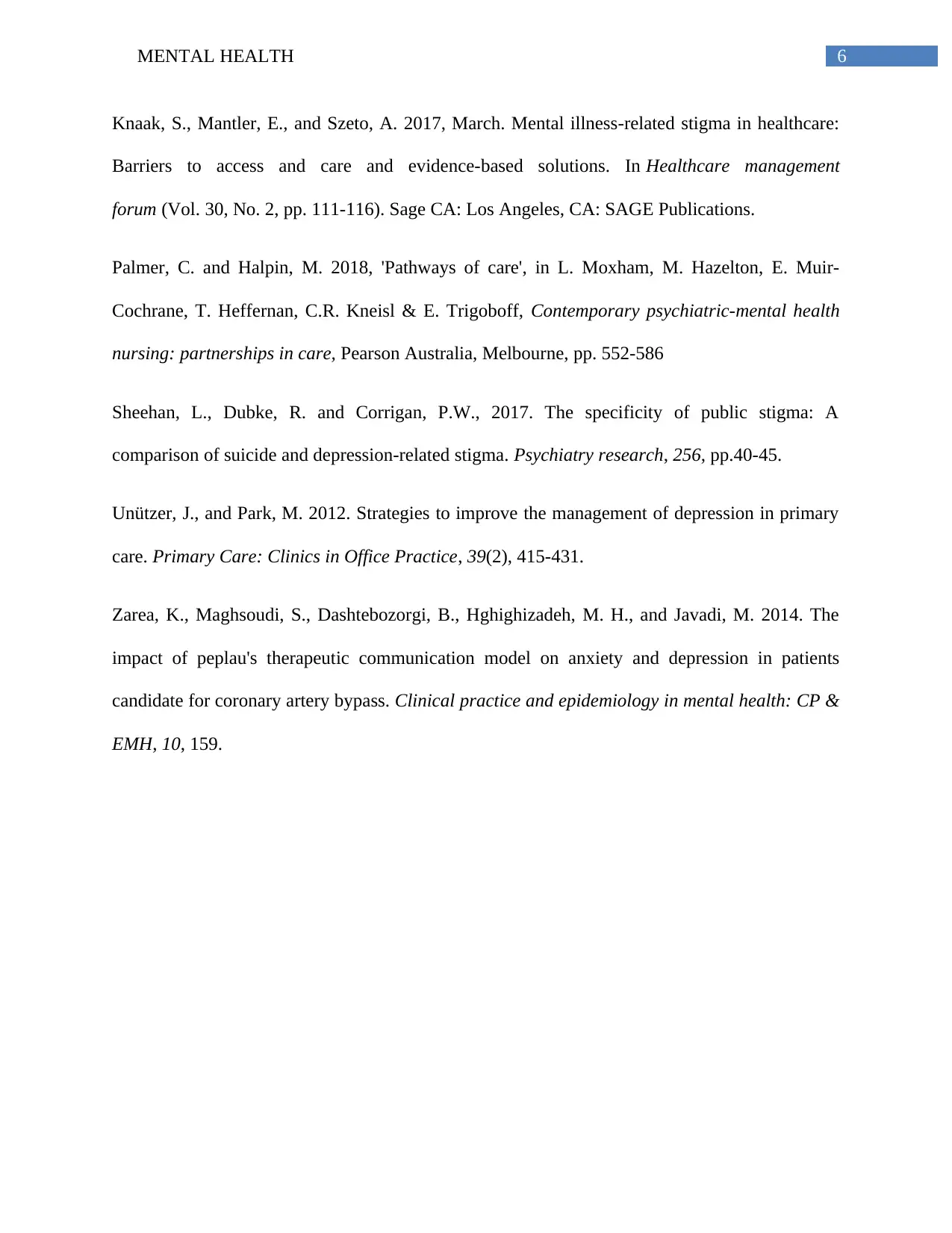
6MENTAL HEALTH
Knaak, S., Mantler, E., and Szeto, A. 2017, March. Mental illness-related stigma in healthcare:
Barriers to access and care and evidence-based solutions. In Healthcare management
forum (Vol. 30, No. 2, pp. 111-116). Sage CA: Los Angeles, CA: SAGE Publications.
Palmer, C. and Halpin, M. 2018, 'Pathways of care', in L. Moxham, M. Hazelton, E. Muir-
Cochrane, T. Heffernan, C.R. Kneisl & E. Trigoboff, Contemporary psychiatric-mental health
nursing: partnerships in care, Pearson Australia, Melbourne, pp. 552-586
Sheehan, L., Dubke, R. and Corrigan, P.W., 2017. The specificity of public stigma: A
comparison of suicide and depression-related stigma. Psychiatry research, 256, pp.40-45.
Unützer, J., and Park, M. 2012. Strategies to improve the management of depression in primary
care. Primary Care: Clinics in Office Practice, 39(2), 415-431.
Zarea, K., Maghsoudi, S., Dashtebozorgi, B., Hghighizadeh, M. H., and Javadi, M. 2014. The
impact of peplau's therapeutic communication model on anxiety and depression in patients
candidate for coronary artery bypass. Clinical practice and epidemiology in mental health: CP &
EMH, 10, 159.
Knaak, S., Mantler, E., and Szeto, A. 2017, March. Mental illness-related stigma in healthcare:
Barriers to access and care and evidence-based solutions. In Healthcare management
forum (Vol. 30, No. 2, pp. 111-116). Sage CA: Los Angeles, CA: SAGE Publications.
Palmer, C. and Halpin, M. 2018, 'Pathways of care', in L. Moxham, M. Hazelton, E. Muir-
Cochrane, T. Heffernan, C.R. Kneisl & E. Trigoboff, Contemporary psychiatric-mental health
nursing: partnerships in care, Pearson Australia, Melbourne, pp. 552-586
Sheehan, L., Dubke, R. and Corrigan, P.W., 2017. The specificity of public stigma: A
comparison of suicide and depression-related stigma. Psychiatry research, 256, pp.40-45.
Unützer, J., and Park, M. 2012. Strategies to improve the management of depression in primary
care. Primary Care: Clinics in Office Practice, 39(2), 415-431.
Zarea, K., Maghsoudi, S., Dashtebozorgi, B., Hghighizadeh, M. H., and Javadi, M. 2014. The
impact of peplau's therapeutic communication model on anxiety and depression in patients
candidate for coronary artery bypass. Clinical practice and epidemiology in mental health: CP &
EMH, 10, 159.
1 out of 7
Related Documents
Your All-in-One AI-Powered Toolkit for Academic Success.
+13062052269
info@desklib.com
Available 24*7 on WhatsApp / Email
![[object Object]](/_next/static/media/star-bottom.7253800d.svg)
Unlock your academic potential
Copyright © 2020–2026 A2Z Services. All Rights Reserved. Developed and managed by ZUCOL.





